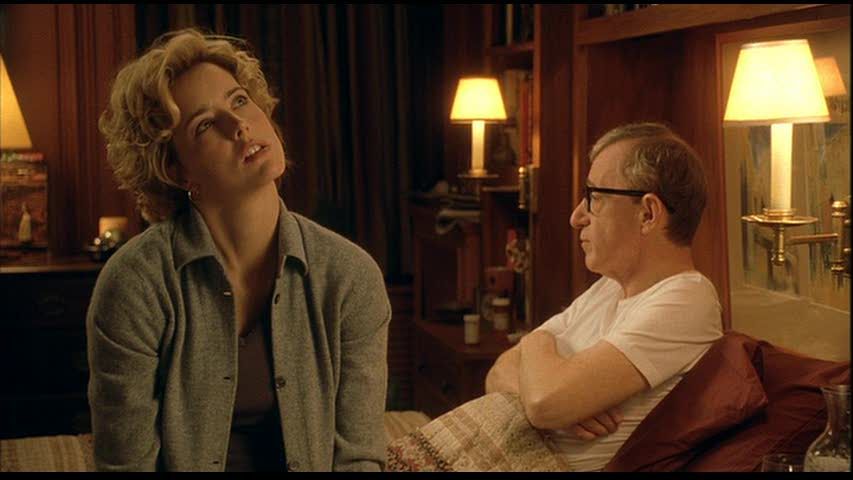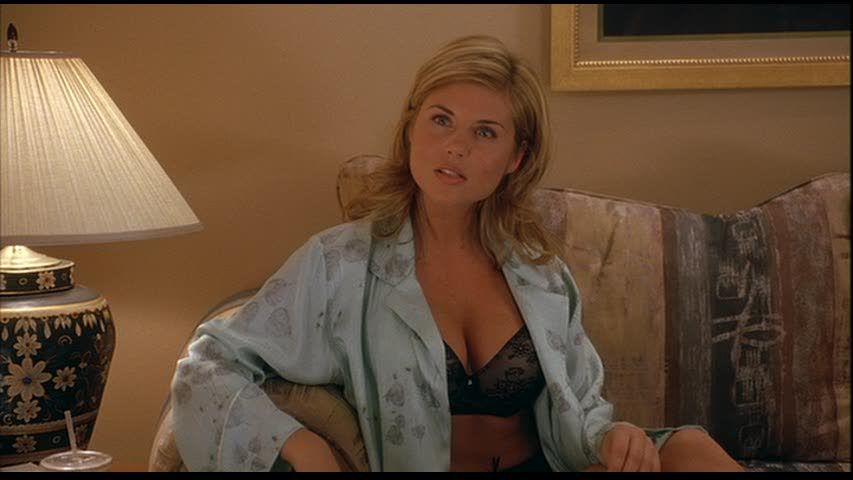
When people say that Woody Allen's career has gone downhill in recent years, I suspect many of them are especially thinking of Hollywood Ending. It's ironic, for a film about vision and filmmaking, that this is one of Woody's most indifferently shot and conceived films, a film of such staggering incompetence and awkwardness that one can hardly believe it when sporadic moments here and there actually work: it's downright bizarre to see flashes of Woody's comic brilliance shining through in the midst of such a train wreck. It's impossible to watch the film without wondering if Woody intended it to be this bad, if we're meant to be watching the film made by Woody's character within the film, a struggling director whose comeback chance is sabotaged when he develops a psychosomatic case of blindness. It's otherwise hard to account for the bland television aesthetic of so many scenes, the horribly stilted acting and torturous dialogue, the bursts of lively comedy alternating with long stretches of dead time.
Watching the film as someone who's enjoyed even most of Woody's supposed "lesser" works, it's as though all the popular criticisms of the director have suddenly come true. His dialogue has always been wordy and contrived, but in the past he's managed to make it sound, if not quite natural, then at least fluid and stylish and, most importantly, funny. In this film, as in The Curse of the Jade Scorpion, Woody's dialogue is flat, dead on the page, its artificiality and silliness all too apparent. As the director Val Waxman, Woody fares best, probably because he's basically playing himself — and that too is a problem, because the schtick, the flailing neurotic hypochondriac thing, is wearing dangerously thin. But it's worse when he puts his lines in someone else's mouth. As his ditzy girlfriend Lori, Debra Messing is oddly off-key and empty, maybe even emptier than the part seems to call for. As the Chinese translator who helps Val hide his blindness on the set, Barney Cheng is more like a robot, unfamiliar with humanity's strange habit of conversation, than a foreigner, so exaggerated is his stilted accent and mannered tone. Woody's never exactly been subtle in his treatment of non-white characters but this is egregious. And the introduction of Val's green-haired, rodent-eating, heavy metal-loving son Scumbag X (Mark Webber) is simply embarrassing: it's meant to show how out of touch Val is and only ends up proving how out of touch Woody is.
To continue recounting the absurd scenes in this mess of a film would only be painful — why prolong the misery? — though special mention should probably be made of Woody's utterly inept attempts at shilling for 7-Up and Pepsi through some hilariously obvious product placement. What's really perverse about Hollywood Ending is that a lot of it, surprisingly, actually works in spite of the tremendous odds against it. There are stretches of comedy that Woody handles with his usual light touch and supple wit, like a great scene featuring Tiffani Thiessen in a cameo turn as a seductive actress whose feminine wiles are wasted on the blind Val. And Woody's sputtering delivery often stumbles into some typically clever lines, much of it admittedly variations on familiar material ("For me, the nicest thing about masturbation is afterward, the cuddling time.") but no less funny for its familiarity.

It's as disconcerting as ever to see the aging Woody cast himself in romantic comedies opposite much younger women, but Téa Leoni is nevertheless a welcome presence here. Woody's rapport with Leoni, as his ex-wife Ellie, is certainly nowhere close to his best comic pairings (Diane Keaton, Mia Farrow), but it's also not nearly as flat and affectless as his doomed attempt at sparking some humor out of Helen Hunt in Jade Scorpion. Leoni's an effective comic actress, and she invests her scenes with a subtlety and attentiveness that the often lackluster script hardly demands of her. In one of her best scenes, as Val waxes nostalgic about their past together, Ellie sits on the edge of his bed in the foreground, wearily rolling her head around, half paying attention and half simply trying to work out the kinks in her neck. It could have been broadly overplayed for comic effect, for a cheap punchline, but the way Leoni plays it it's not even a joke: it's just a woman tired after a long day and in no mood for reminiscences.
Other scenes go on so long that they have time to shift from annoying and off-putting to outrageously funny, like the early scene, before Val's hysterical blindness, where Val and Ellie meet for a drink to discuss the plans for the upcoming movie. Val keeps shifting fluidly from casual shop talk about who he wants to hire and what he wants to do, to outraged ramblings about the way Ellie had cheated on him with the producer Hal (Treat Williams) and destroyed their marriage. Woody's neurotic schtick is initially just aggravating, but he keeps it up so long, and handles the transitions from businesslike to ranting so smoothly, that it's soon hard to resist the scene's hysterical flow, and the material becomes funny almost in spite of itself. The capper is Val's list of very specific gripes about the ways in which he was tipped off to the affair, like getting a bill for a room and escargot from the Plaza Hotel: "sex and snails with that roast beef from Beverly Hills!"
Hollywood Ending can, in spurts, be as funny as any of Woody's best material — but then, the film throws out so many one-liners and sketches that some of them were bound to stick. Many others don't, and much of the film is a pile-up of bad ideas, half-realized scenes and dead-on-arrival jokes. It's like a Woody Allen sketchbook committed to film with no self-editing or polishing up, an accumulation of discarded routines in which the good moments are swallowed up by deep abysses of bad acting and careless staging. This film has more ups and downs than its relentlessly dull and mediocre predecessor Jade Scorpion. The funny bits are funnier, but when the film is bad — as it too often is — it's worse than Woody has ever been before in his entire long career.








0Awesome Comments!